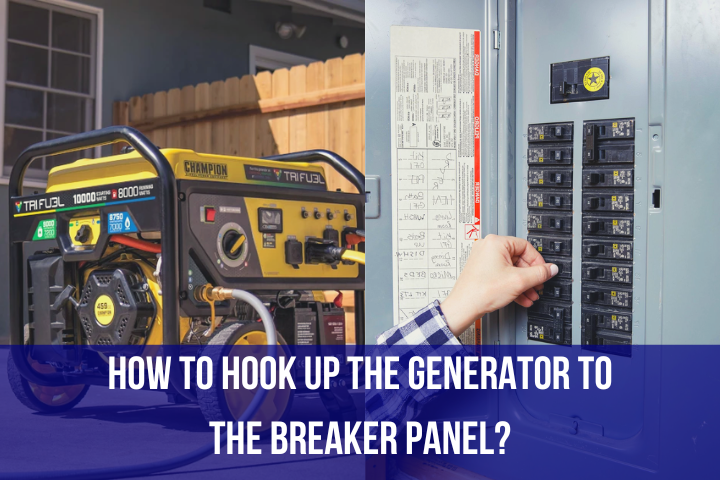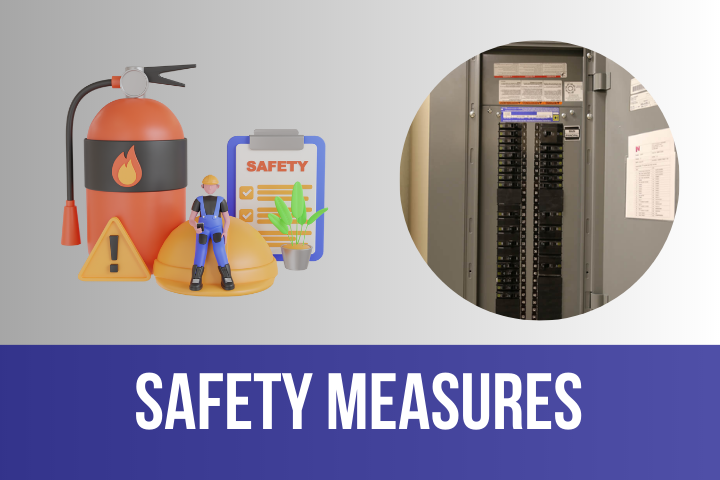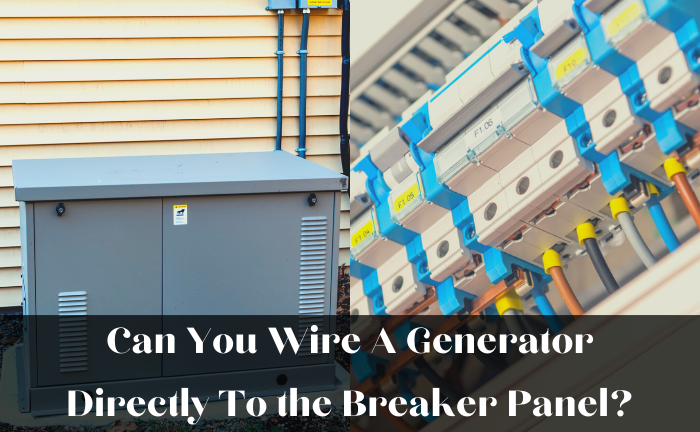Power outages are truly unbearable for me, especially in the summer. Whether you’re a homeowner or running a business in an office, you always want to run your chores without any interruption. You must have thought that the repeatedly setting up of the generator is quite tiring. Don’t worry. I have found a perfect solution for you.
You can wire a generator directly to the breaker panel. Nevertheless, I’ll recommend you hire a professional electrician for this job. This is because you may damage the system or harm yourself by doing it on your own.
Still, if you want to go DIY on wiring a generator to your breaker panel, this article is for you. In this blog, I’ll walk you through the step-by-step guide including the safety measures.
Table of Contents
How To Hook Up the Generator To the Breaker Panel?

There’s no rocket science behind the connection of a generator with the breaker panel. All you need to know is a few basic steps that will enable you to deal with sudden power outages. So, without further ado, let’s get straight into it.
Tools You Need
First of all, you’ll have to gather all the essential equipment that you may need for the procedure. I’ve fetched a few must-have tools for wiring your generator with the load center.
- Gloves
- Goggles
- Screws
- Power consumption watt tester
- Hand drill
- Extension Cord
- Oscillating Tools
- Three-prong round plug & wire
- Sealant
- Metal waterproof box
- Circuit breakers with interlock kits
- Generator Set
Gather all the enlisted tools and move forward to the process.
Things To Consider Before Commencing Work
According to my research, there are a few specific factors to consider before connecting your generator to the breaker panel. Let’s delve into and understand the factors.
- Initially, you should ensure the space for the generator circuit in the breaker panel.
- You must remember that the breaker interlock will go on the left side of the breaker.
- For safety purposes, you must connect the generator to the breaker panel with the help of transfer switches.
- If you have a minor knowledge of electrical work, you can handle this work on your own.
- In case of any hesitation, you must see a professional to do your job.
Step-By-Step Guide
Following my collected data, here’s a step-by-step guide to wiring a generator directly to the breaker panel.
1- Remove The Cover Panel
Always make sure to unplug and turn off all the connected devices to the circuit before commencing the electrical work. Now, you can shut down your circuits and main breaker panel. In my opinion, you must be sure that there’s no electric flow to electrocute you.
Here comes the time to remove the cover panel. All you have to do is unscrew all the screws holding the cover panel and remove it.
2- Install The Interlock Kit
After removing the cover panel. You can move forward to install the interlock kit on it. Grab the drill that I’ve told you about before in the tools collection and make holes for the installation of your interlock kit.
I recommend you put in bolts to secure the interlock kit on the panel cover. You can also select pliers to snap out the knock-out cover for the circuit breaker position.
3- Installation Of Power Inlet Box
Now, you’ll have to find a suitable location to install a power inlet box. I’ll suggest you choose a location where you can easily access and connect the generator set. Another way to mount your power inlet box is to build holes with the help of an electrical drill near your breaker panel.
While installing the box outside, you must use a conduit to provide additional wire protection.
4- Start Wiring The Connections
As you’re done with the installation of the power inlet box, you can commence wiring the connections. Let me make it more understandable for you. Run the wire from the power inlet box through the conduit to the panel breaker.
There are usually two hot wires, two neutral wires, and one ground wire in the power inlet box. You can recognize the wires by the following method.
- Red & Black for hot wires
- White for neutral wire
- Green for ground wire
5- Install The Circuit Breaker
You must connect the ground wire to the ground bus bar and the neutral wire to the neutral bus bar for the installation of the circuit breaker. Now, connect the two hot wires with the circuit breaker for the generator circuit connection.
Here comes the time to install the circuit breaker on the panel board. According to my research, you must also install the circuit breaker retaining bracket included in the interlock kit.
6- Install The Cover Panel
Now that you have done all the above steps successfully, you should install the panel cover. You must screw all the corners of the cover panel properly. That’s it. Your generator set connection is ready to work.
7- Time To Test Your Work
I’ll suggest you test your work before going to operate it for big chores. First of all, connect your generator set with your power cord to the power inlet. Now, turn on your generator and switch on its built-in circuit breaker. If your generator set is running properly, you can turn on each circuit at a time to check how many circuits can run with your generator set.
Things To Avoid
As you have gone through a detailed guide to wiring a generator to the breaker panel, you must know there are various factors to avoid. The most essential thing is avoiding the use of double male plugs. Here are a few reasons to prohibit the use of double male plugs.
- It is illegal.
- Violation of electrical code.
- It poses fire hazards.
- More chances of getting shocked.
Safety Measures

In my opinion, you must be aware of safety measures before getting into electrical work. I’ll tell you a few basic safety measures that will help you to deal with emergency situations.
- It’s important to ensure your portable generator is not powering your home’s electrical equipment to prevent injury from electric shock.
- You must inquire if the generator is grounded properly.
- You can connect a generator with a fuse box as a short circuit will stop the electric flow and save you from fatal outcomes.
Related: How to Connect Generator To House Without Transfer Switch?
Conclusion
In conclusion, I’ll say that the electrical work must be handed over to a professional. Moreover, if you have a bit of knowledge of electricity, there’s nothing wrong. You can do your work on your own.
In this writing, I’ve given you a step-by-step guide that’ll help you to connect your generator to a breaker panel. You have also got the safety measures to avoid any emergency conditions.

